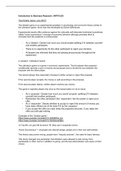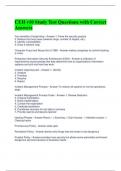Introduction to Business Research: ARTICLES
The Dictator Game: List (2007)
The dictator game is an experimental paradigm in psychology and economic theory similar to
the ultimatum game, which was first developed by Daniel Kahneman.
Experimental results offer evidence against the rationally self-interested individual (sometimes
called “homo economicus”) concept of economic behavior although precisely what to
conclude from the evidence is controversial.
- As a 'dictator': Decide how much you would dictate splitting £10 between yourself
and another participant.
- There is no opportunity for the other participant to reject your decision.
- All players are informed that they are playing anonymously throughout the
experiment.
A variation: “Ultimatum Game”
The ultimatum game is a game in economic experiments. The first player (the proposer)
conditionally receives a sum of money and proposes how to divide the sum between the
proposer and the other player.
The second player (the responder) chooses to either accept or reject this proposal.
If the second player accepts, the money is split according to the proposal.
If the second player rejects, neither player receives any money.
The game is typically played only once so that reciprocation is not an issue.
- As a ‘proposer’: Decide how much you would ‘propose’ splitting £10 between
yourself and another participant.
- Remember the other participant (the ‘responder’) has the power to reject your
offer.
- As a ‘responder’: Decide whether to accept or reject the amount of money you
have been offered out of the total £10 by the ‘proposer’.
- If you accept the offer you each keep the proposed amounts, if you reject the
offer you both get nothing.
Examples of the “dictator game”:
https://www.youtube.com/watch?v=Z2hBPhkr_Eo
https://www.youtube.com/watch?v=fUWpIooAqNU
“A” has $5, can give $5 to person “B” (they are in separate rooms)
“Homo Economicus” = all people are rational beings, always act in their own self-interest.
This theory was proven wrong: people have “inequity aversion”, the need for basic fairness.
This study changed one parameter: that dictators were allowed to take money from
participants in other rooms in addition to giving, and the test administrator was aware of their
choice.
, By allowing “A” to take from “B”, the results changed. Both “Homo Economicus” and “Inequity
Aversion” were proven wrong, and replaced with “Moral Cost Function”, which shows
influence of social norms and moral cost of behaving selfishly.
Additionally, the origin of the money was changed: participants would “earn” what they had to
give.
Details of the study:
- Sample = 200 “dictators”
- Subjects were undergrads at Univ Maryland
- 1 control group and 3 experimental groups
- Random allocation
- “Between-subject” (only one time)
- Variation: the dictator can “take” money from the other room, not just give/withhold
- Lots of historical review, citation of intellectual indebtedness
Conclusions:
- When the choice set includes “taking”, fewer participants give money
- But still, even in variation, participants did not always choose the most selfish
outcomes: “institutions” do matter
- People don’t just care about their own material payoffs: fairness, equity and
reciprocity matter
Type of study:
- Positivist/Objectivist: researcher is detached
- Deductive
- Mono-method
- Epistemological: natural science, classical experiment
- Ontological: one measurable reality
- Axiological: values are static and similar across participants
- Quantitative, quantifiable, repeatable results
Variables:
- Independent: amounts given to the dictator
- Dependent: amount of giving and taking by the dictator
- Mediating: ages of the participants (students gave less)
- Moderating: personal circumstances of the participants
- Control: authority figure, lab setting, restricted access to other group
Validity:
- Internal = high: carefully controlled lab-based experiment with random allocation
- External = low: lab-based and thus difficult to apply to the real world
- Construct = med: not clear what is being measured; philanthropy, selfishness,
adherence to social norms or institutions
***********
Gang Leader for a Day: Venkatesh (2008)
Q: He did not seem to have a clear research question. Although he does come out at the end
with a clear conclusion. Can we say that his study was inductive?
“How does it feel to be black and poor?”
- Gang Leader for a Day is Sudhir Venkatesh’s account of the six years he spent doing
research in Chicago’s housing projects as a Sociology graduate student.
The Dictator Game: List (2007)
The dictator game is an experimental paradigm in psychology and economic theory similar to
the ultimatum game, which was first developed by Daniel Kahneman.
Experimental results offer evidence against the rationally self-interested individual (sometimes
called “homo economicus”) concept of economic behavior although precisely what to
conclude from the evidence is controversial.
- As a 'dictator': Decide how much you would dictate splitting £10 between yourself
and another participant.
- There is no opportunity for the other participant to reject your decision.
- All players are informed that they are playing anonymously throughout the
experiment.
A variation: “Ultimatum Game”
The ultimatum game is a game in economic experiments. The first player (the proposer)
conditionally receives a sum of money and proposes how to divide the sum between the
proposer and the other player.
The second player (the responder) chooses to either accept or reject this proposal.
If the second player accepts, the money is split according to the proposal.
If the second player rejects, neither player receives any money.
The game is typically played only once so that reciprocation is not an issue.
- As a ‘proposer’: Decide how much you would ‘propose’ splitting £10 between
yourself and another participant.
- Remember the other participant (the ‘responder’) has the power to reject your
offer.
- As a ‘responder’: Decide whether to accept or reject the amount of money you
have been offered out of the total £10 by the ‘proposer’.
- If you accept the offer you each keep the proposed amounts, if you reject the
offer you both get nothing.
Examples of the “dictator game”:
https://www.youtube.com/watch?v=Z2hBPhkr_Eo
https://www.youtube.com/watch?v=fUWpIooAqNU
“A” has $5, can give $5 to person “B” (they are in separate rooms)
“Homo Economicus” = all people are rational beings, always act in their own self-interest.
This theory was proven wrong: people have “inequity aversion”, the need for basic fairness.
This study changed one parameter: that dictators were allowed to take money from
participants in other rooms in addition to giving, and the test administrator was aware of their
choice.
, By allowing “A” to take from “B”, the results changed. Both “Homo Economicus” and “Inequity
Aversion” were proven wrong, and replaced with “Moral Cost Function”, which shows
influence of social norms and moral cost of behaving selfishly.
Additionally, the origin of the money was changed: participants would “earn” what they had to
give.
Details of the study:
- Sample = 200 “dictators”
- Subjects were undergrads at Univ Maryland
- 1 control group and 3 experimental groups
- Random allocation
- “Between-subject” (only one time)
- Variation: the dictator can “take” money from the other room, not just give/withhold
- Lots of historical review, citation of intellectual indebtedness
Conclusions:
- When the choice set includes “taking”, fewer participants give money
- But still, even in variation, participants did not always choose the most selfish
outcomes: “institutions” do matter
- People don’t just care about their own material payoffs: fairness, equity and
reciprocity matter
Type of study:
- Positivist/Objectivist: researcher is detached
- Deductive
- Mono-method
- Epistemological: natural science, classical experiment
- Ontological: one measurable reality
- Axiological: values are static and similar across participants
- Quantitative, quantifiable, repeatable results
Variables:
- Independent: amounts given to the dictator
- Dependent: amount of giving and taking by the dictator
- Mediating: ages of the participants (students gave less)
- Moderating: personal circumstances of the participants
- Control: authority figure, lab setting, restricted access to other group
Validity:
- Internal = high: carefully controlled lab-based experiment with random allocation
- External = low: lab-based and thus difficult to apply to the real world
- Construct = med: not clear what is being measured; philanthropy, selfishness,
adherence to social norms or institutions
***********
Gang Leader for a Day: Venkatesh (2008)
Q: He did not seem to have a clear research question. Although he does come out at the end
with a clear conclusion. Can we say that his study was inductive?
“How does it feel to be black and poor?”
- Gang Leader for a Day is Sudhir Venkatesh’s account of the six years he spent doing
research in Chicago’s housing projects as a Sociology graduate student.



